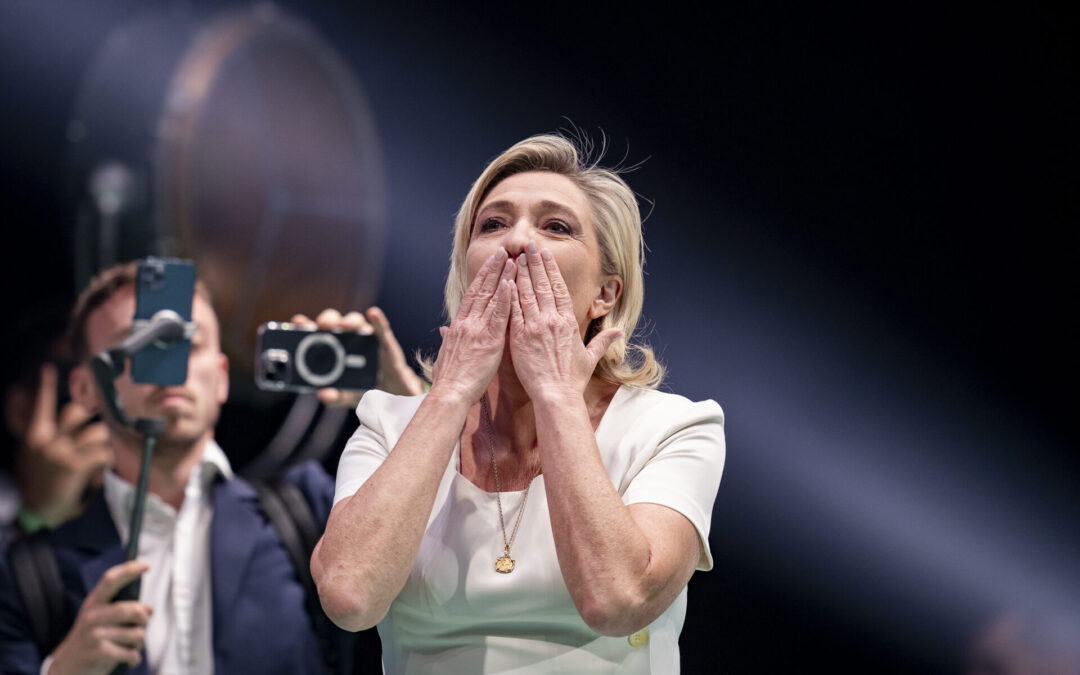Right-wing parties and far-right made significant gains in several countries in the 2024 European elections. In Italy, prime minister Giorgia Meloni‘s national conservative and populist Fratelli d’Italia (FdI) party came out on top. In France, Marine Le Pen‘s right-wing populist Rassemblement National (RN), secured the most votes. In Germany, the right-wing populist Alternative für Deutschland (AfD) achieved its best result to date, coming second behind the conservative CDU/CSU. In Austria, the right-wing Freiheitliche Partei Österreichs (FPÖ), became the largest party.
In the European Parliament, the two groups with the most right-wing and populist political parties, the European Conservatives and Reformists (ECR) and Identity and Democracy (ID), made some significant gains. But the pro-European camp still remains by far the largest in the European Parliament, with the centre-right European People’s Party (EPP) securing the most seats. Even if all the right-wing parties were to join forces, they would probably end up with fewer than 200 seats, far short of the 361-seat majority needed.
Italy: Meloni strengthens her position in the EU
In Italy, Fratelli d’Italia scored 28.8 percent of the votes – an increase of more than 20 percentage points compared to the 2019 European elections. A left-wing alliance around the social-democratic Democratic Party (PD) came second with 24.1 percent.
Meloni was the lead candidate for Fratelli d’Italia in these European elections, but she does not want to go to the European Parliament as an MEP, preferring to stay in Rome as prime minister. The 47-year-old has led a coalition of three right-wing parties since October 2022. The result is likely to increase her influence at the European level.
“Italy can present itself at the G7 and in Europe with the strongest government of all,” stressed Meloni. According to the Italian prime minister, the European elections have helped her government to consolidate its position.
France: Le Pen’s far-right nationalists in the lead
In France, the right-wing nationalist and populist RN party led by Marine Le Pen won with 31.4 percent of the votes, more than twice as much as the Renaissance party of current French President Emmanuel Macron. As a result, the head of state announced new elections of the lower house of France’s parliament, the National Assembly.
The strong showing by Le Pen’s party has sparked widespread protests in France. Hundreds of thousands of people marched against her party in France over the weekend following the European elections.
Germany: AfD strongest force in eastern Germany
Germany has also moved to the right in the European elections. The right-wing populist Alternative für Deutschland (AfD) party came second with 15.9 percent of the votes, an increase of almost five percentage points compared to 2019. The party did even better in the five former East German states, where it came first.
The conservative CDU/CSU alliance, which is currently part of the opposition, won the most votes nationwide, with 30.0 percent. The federal government parties – Social Democrats (Sozialdemokratische Partei Deutschlands, SPD), Greens and Liberals (Freie Demokraten, FDP) – suffered losses and together received just under a third of the vote.
Germany’s next federal election will take place next year. In the eastern German states of Thuringia, Saxony and Brandenburg, elections to the state parliaments (Länder parliaments) will be held this autumn.The most important functions of German state parliaments include electing the respective head of state (prime minister), supervising the state governments and passing state laws.
Austria: Right wing takes the lead for the first time
In Austria, for the first time, the right-wing populists came out on top. The FPÖ, a member of the ID group in the European Parliament, won 25.4 percent of the votes. The conservative Austrian People’s Party (Österreichische Volkspartei, ÖVP) secured 24.5 percent. The Social Democratic Party of Austria (Sozialdemokratische Partei Österreichs, SPÖ) followed with 23.2 percent.
During the election campaign, the FPÖ often emphasised its scepticism towards the EU with the slogan ‘Stop EU madness’ and criticised the EU as a warmongering force in relation to Russia’s war against Ukraine. For party leader Herbert Kickl, the goal of becoming Austria’s next chancellor seems to be getting closer. Austria is due to elect a new parliament this autumn.
Can right-wing parties set a new tone for the EU?
The course of the EU is primarily determined by the European Council, the body of the 27 heads of state and government. For the time being, the European elections will not change anything dramatically there.
In the European Council, which holds regular summits, the parties of the centre-right EPP alliance are currently the strongest political force, with 13 heads of state and government being affiliated with the group. They are followed by the Social Democrats and the Liberals. The only clear right-wing politicians in the European Council so far are Italy’s Prime Minister Giorgia Meloni and Hungary’s Prime Minister Viktor Orbán.
The EPP also remains the strongest political force in the European Parliament. Even if all the right-wing parties joined forces, they would probably end up with less than 200 of the 720 seats – far from a majority.
The ECR and ID groups in the European Parliament disagree on a number of fundamental issues. Differences exist not only between the groups, but also within them.
“It still remains to be very difficult to nationalists to cooperate on the international level and it plays a big role why they can not impact much on public policy,” said Nathalie Brack, Associate Professor of Political Science of Political Science (ULB), in an interview with the European Newsroom (enr) in May.
This article is part of the enr’s EU Elections Spotlight: The EU after the European elections. The content is based on news by agencies participating in the enr.
